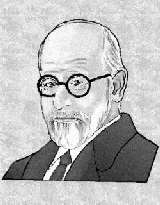
Born: May 6, 1856, in Frieberg, Moravia (now PrÝbor, Czech Republic)
Died: September 23, 1939, in London, England
Sigmund Freud was born in 1856 in what is now the Czech Republic. After moving a couple of times, his family settled in Austria where he lived for most of his life.
His initial interest lay in the field of law, but he was inspired by the discoveries of Goethe and decided to study natural sciences at the University of Vienna. He found neurological research so interesting that he ignored other courses and it took him three extra years to complete his medical degree which he eventually received in 1881.
He began developing his theories of psychoanalysis when he worked with Josef Breuer from 1880 to 1882 By working with patients like Bertha Pappenheim, they found that when patients talked about whatever came into their minds their symptoms of hysteria disappeared. This was later dubbed free association.
After many arguments with his parents, he married Martha Bernays in 1886. In that same year he established a private practice, but his unorthodox methods brought criticism from the medical community.
Nonetheless he continued to develop his theories and in 1896 he coined the term psychoanalysis to describe his methodology. He used this term to describe his technique of uncovering repressed childhood traumas. He believed that the symptoms of hysteria were caused by pent-up emotional energy from long remembered traumatic experiences.
Freud's emphasis on dreams stemmed from belief that the unconscious mind reveals details about these traumas. He even analyzed many of his own dreams. This dream analysis led him to his most famous theory - the Oedipus complex - a theory which says a child has an erotic attachment to the parent of the opposite sex and a resentment of the other parent.
His concepts of the Oedipus complex, the death wish and penis envy have been used so often in art and literature that many people are aware of Freud's work despite never having read any of his work. Some would say his work has even been degraded by popular literature.
Despite being appointed a full professor at the University of Vienna in 1902, his work was still not well received and he worked in isolation. Finally in 1906 he began to attract followers which culminated in 1910 with the formation of the International Psychoanalytic Association.
After World War I his focus shifted and he concentrated on applying his ideas to the interpretation of religion, mythology, art, and literature.
In 1923 he was diagnosed with jaw cancer and he continued to pursue philosophy despite the pain of the disease. He was later forced to flee Austria due to the anti-Semitism that followed the German occupation. He relocated in England with his family where he died one year later, in 1939.